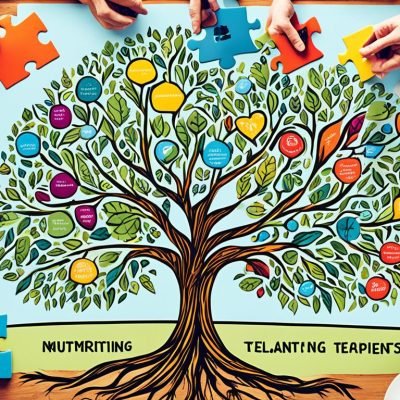Did you know that employees who participate in professional development workshops are 15% more likely to advance in their careers? Professional development plays a crucial role in enhancing skills and promoting personal and leadership growth. Investing in employees through career advancement training and personal growth seminars benefits both individuals and organizations, leading to a more skilled workforce, increased job satisfaction, and reduced turnover.
Key Takeaways:
- Professional development workshops are essential for enhancing skills and promoting personal and leadership growth.
- Investing in employees through career advancement training and personal growth seminars benefits both individuals and organizations.
- Participating in professional development programs leads to a more skilled workforce.
- Employees who engage in professional development are more likely to experience increased job satisfaction.
- Professional development workshops contribute to reduced employee turnover.

What is Professional Development?
Professional development refers to ongoing education and skill-building that employees undertake to further their careers. It goes beyond acquiring technical skills and encompasses the development of soft skills such as communication, critical thinking, and leadership.
Soft skills, also known as interpersonal skills, are becoming increasingly important in today’s professional world. These skills, which include effective communication, problem-solving, and adaptability, enable individuals to collaborate effectively, lead teams, and navigate complex work environments.
Professional development can be achieved through various avenues, including:
- Workshops: In-person or virtual workshops provide focused and intensive training on specific topics or skills.
- Conferences: Attending industry conferences allows professionals to stay updated on the latest trends, network with peers, and gain insights from industry experts.
- Online courses: E-learning platforms offer a wide range of courses that professionals can take at their own pace.
- Coaching and mentoring: Working with a coach or mentor provides personalized guidance and support for professional growth.
- On-the-job training: Learning from experienced colleagues and taking on new responsibilities can contribute to continuous skill development.
- Certifications: Obtaining industry-specific certifications validates expertise and demonstrates dedication to professional growth.
- Team building activities: Engaging in team building exercises fosters collaboration, communication, and problem-solving skills.
- Job shadowing: Observing and learning from professionals in different roles provides valuable insights and broadens perspectives.
- Job rotation: Rotating through different roles within an organization allows professionals to gain diverse experience and expand their skill set.
By actively engaging in professional development, individuals can continuously enhance their knowledge, skills, and expertise, positioning themselves for career advancement and growth.
Throughout their careers, professionals confront new challenges and changing demands. Therefore, ongoing education and skills growth are essential for staying relevant and competitive in the workplace. Whether it’s acquiring the latest industry knowledge, sharpening technical skills, or developing leadership capabilities, professional development equips individuals with the tools necessary to succeed in their chosen fields.
Benefits of Professional Development for Employees
Participating in professional development programs offers numerous benefits for employees. It helps them gain new skills, become more efficient and effective in their roles, and increases job satisfaction.
One of the key advantages of professional development is that it keeps employees up-to-date with the latest trends and best practices in their field. In today’s fast-paced, ever-evolving work environment, staying current is crucial for career growth and success. By continuously learning and adapting, employees can ensure that they remain relevant and valuable assets to their organizations.
Moreover, professional development provides employees with promotion opportunities. By acquiring new skills and knowledge, individuals become more qualified for higher-level positions within their companies. They can take on additional responsibilities and contribute to their organizations in meaningful ways, increasing their chances of career advancement.
Job Satisfaction and Self-Improvement
Professional development also plays a significant role in enhancing job satisfaction. When employees feel supported in their growth and development, they are more likely to feel fulfilled and engaged in their work. It demonstrates to them that their organization values their personal and professional growth, leading to a greater sense of loyalty and commitment.
Additionally, participating in professional development programs fosters a sense of accomplishment and self-improvement. As individuals acquire new skills and see the positive impact on their performance, they gain confidence and motivation to further develop themselves. This self-improvement mindset can extend beyond the workplace and positively influence other areas of their lives as well.
Investing in professional development is not only an investment in employees’ skills and knowledge; it is an investment in their overall well-being and satisfaction in their careers.
In conclusion, professional development offers a range of benefits for employees, including career growth, increased job satisfaction, staying up-to-date with industry trends, promotion opportunities, and self-improvement. By actively engaging in professional development opportunities, individuals can continuously enhance their skills, achieve their career goals, and lead fulfilling professional lives.
Benefits of Professional Development for Employers
Investing in professional development not only benefits individual employees but also provides significant advantages for employers. By prioritizing growth and learning opportunities for their workforce, companies can create a skilled and knowledgeable team, leading to improved processes, efficiency, and competitiveness. Moreover, offering professional development programs demonstrates a commitment to employees’ success, fostering higher morale and loyalty within the organization.
A skilled workforce obtained through professional development initiatives gives companies a competitive advantage in the market. Organizations that invest in their employees’ continuous learning and upskilling attract and retain top talent, as job seekers consider opportunities for growth and skill enhancement crucial when evaluating prospective employers.
Employee satisfaction and talent retention are significantly influenced by professional development efforts. When employees are given opportunities to enhance their skills and advance in their careers, they feel valued and supported by the company. This commitment to their development increases their satisfaction with their roles and fosters a sense of loyalty towards the organization, reducing turnover rates.
Quote: “Investing in professional development shows employees that you are willing to invest in their future. It creates a positive work environment, improves job satisfaction, and boosts employee commitment and loyalty.”
By offering professional development programs, employers create a culture of continuous learning and upskilling. This commitment to employee growth not only enhances their individual performance but also fosters a collaborative and innovative work environment. Employees who develop their skills through professional development are more motivated, productive, and driven to contribute to the company’s success.
Overall, by investing in professional development, companies reap the benefits of a skilled workforce, gain a competitive advantage, improve employee satisfaction and retention, promote talent development and upskilling, and demonstrate a strong commitment to their employees’ success.
Six Ways Professional Development Can Boost Engagement
Professional development programs offer more than just talent acquisition and retention benefits. They also play a crucial role in boosting employee engagement, resulting in a range of positive outcomes for both individuals and organizations.
- Increased Job Satisfaction: Through professional development, employees gain new skills and knowledge, allowing them to feel more confident and competent in their roles. This enhanced job satisfaction leads to higher levels of engagement and a greater sense of fulfillment.
- Motivation and Productivity: When employees participate in professional development programs, they are motivated to apply their newly acquired skills and knowledge to their work. This motivation, combined with the confidence gained from professional growth, leads to increased productivity and performance.
- Innovation: Professional development fosters innovation by exposing employees to new ideas, trends, and best practices in their field. The fresh perspectives gained through continuous learning encourage employees to think creatively and find innovative solutions to challenges.
- Loyalty: Investing in employee development demonstrates a commitment to their growth and success. This fosters a sense of loyalty, as employees feel valued and supported by their organization. Engaged employees are more likely to remain loyal to the company, reducing turnover rates.
- Collaboration: Professional development often involves interactive workshops and activities that encourage collaboration among employees. Through these experiences, employees learn from one another, build relationships, and develop a sense of teamwork and camaraderie.
- Enhanced Career Prospects: By investing in their professional development, employees gain the skills and knowledge necessary for career advancement within the organization. This presents them with new career prospects and growth opportunities, further increasing their engagement and commitment to the organization.
Overall, professional development programs have a significant impact on employee engagement, leading to increased job satisfaction, motivation, productivity, innovation, loyalty, collaboration, and improved career prospects.
Where You Can Take Professional Development Courses
Professional development courses offer valuable opportunities for individuals to enhance their skills and acquire new knowledge. These courses can be taken through various channels, providing flexibility and convenience for learners. Whether you prefer in-person learning experiences or the convenience of online platforms, there are numerous options available to suit your needs.
In-Person Courses:
Local trade or industry organizations often offer workshops and classes for professionals seeking to expand their skill set. These in-person courses provide a hands-on learning experience and the opportunity to network with peers in the industry. By attending these workshops, you can gain practical knowledge and insights from experts in your field.
Workshops, Seminars, and Conferences:
Workshops, seminars, bootcamps, and conferences are excellent platforms for professional development. These events bring together industry leaders, experts, and practitioners who share their insights through presentations, interactive sessions, and panel discussions.
| Benefits of Attending Workshops, Seminars, and Conferences |
|---|
| Opportunity to learn from industry experts |
| Networking with professionals in your field |
| Exposure to the latest trends and best practices |
| Access to valuable resources and materials |
| Potential for career advancement and new job opportunities |
Attending these events allows you to stay up-to-date with industry trends, expand your professional network, and gain valuable knowledge to enhance your career.
Online Courses:
In recent years, online courses have gained popularity due to their convenience and accessibility. Online platforms offer a wide range of professional development courses that can be accessed from anywhere, at any time. These courses cover various topics, ranging from technical skills to soft skills development.
Online courses provide the flexibility to learn at your own pace, allowing you to balance professional development with other commitments. Additionally, many online platforms offer interactive elements such as discussion forums and virtual mentorship, fostering engagement and collaboration among learners.
Whether you prefer in-person courses, workshops, seminars, or the flexibility of online learning, there are numerous opportunities available to enhance your professional skills and knowledge. Explore these options and invest in your professional development to unlock new career opportunities and stay ahead in your industry.
Examples of Professional Development Programs
Several renowned professional development programs cater to different career paths and skill sets.
- James Whittaker Program: A comprehensive program for personal and professional success.
- Dale Carnegie Training: Enhances relationships and effective communication skills.
- John Wooden Mentorship Program: Provides guidance for a championship life and career.
- World Bank Group Course: Helps professionals meet modern demands through classical skills.
- Jim Rohn Program: Focuses on character development and goal achievement.
- Stanford University Course: Covers building a successful corporate culture.
- Real Estate Agent Coaching Programs: Offers coaching for real estate professionals.
- Real Estate Team Leadership Coaching: Provides coaching for leadership skills in real estate teams.
- Elayne Fluker Program: Focuses on developing soft skills for personal and professional growth.

These programs offer valuable opportunities for individuals to enhance their skills, acquire new knowledge, and develop the necessary expertise to succeed in their respective fields.
Project Background: Professional Development for Skills for Success Practitioners
This section sheds light on a groundbreaking project aimed at elevating the standards of professional development for Skills for Success practitioners in Canada. The project focuses on implementing a comprehensive professional development framework that ensures consistent outcomes and empowers practitioners with the necessary skills to support the success of learners. This initiative is proudly supported by the Government of Canada’s Office of Skills for Success Program, which recognizes the critical role professional development plays in shaping the future of our workforce.
Note: The image above showcases the importance of professional development and the impact it can have on enhancing the skills of Skills for Success practitioners.
Project Outputs: Framework and Tools for Skills for Success Practitioners
The project outputs of the Skills for Success initiative include a comprehensive professional development framework designed specifically for practitioners in the field. This framework aims to equip practitioners with the necessary knowledge, skills, and tools to enhance their performance and contribute to the success of their organizations.
Alongside the professional development framework, the project also delivers enhanced curricula that align with industry standards and best practices. These updated curricula provide practitioners with the most up-to-date knowledge and competencies required to effectively support individuals on their skills development journey.
To ensure the continuous improvement and growth of practitioners, the project integrates competency assessment tools into the professional development process. These tools enable practitioners to evaluate their skills and identify areas for improvement, allowing for targeted development opportunities and personalized learning experiences.
The project also emphasizes the importance of reporting by creating a system that enables practitioners to track their progress and demonstrate the impact of their work. This reporting mechanism fosters accountability and supports evidence-based decision-making for both practitioners and organizations.
The successful implementation of this project is made possible through collaboration with project partners from the Skills for Success community across Canada. By leveraging the expertise and insights of these partners, the project ensures that the outputs are relevant, practical, and aligned with the needs of the practitioners and the industry as a whole.
Conclusion
Professional development workshops offer a pathway for individuals to enhance their skills, promote personal growth, and develop leadership abilities. By participating in these workshops, individuals can engage in lifelong learning and continuously improve themselves to stay relevant in today’s rapidly evolving professional landscape.
Through skills enhancement, individuals can gain the knowledge and expertise necessary to excel in their careers and contribute to the success of their organizations. The investment in professional development benefits both employees and employers, leading to a more skilled and motivated workforce.
Moreover, professional development workshops provide a platform for personal growth, fostering a sense of accomplishment, self-improvement, and career advancement. They offer opportunities to learn new skills, develop existing ones, and explore new areas of expertise.
Leadership development is also a key focus of professional development workshops. By honing leadership skills, individuals can take on more substantial roles within their organizations and drive meaningful change.
Embracing lifelong learning is essential in today’s fast-paced world. Professional development workshops serve as vehicles for individuals to embark on a journey of continuous improvement and lifelong learning. They enable individuals to stay updated with the latest trends, technologies, and best practices in their respective fields.
“Education is not preparation for life; education is life itself.” – John Dewey
By investing in professional development workshops and committing to lifelong learning, individuals can unlock their full potential, expand their horizons, and achieve greater success in their personal and professional lives.
Get Started with Professional Development
If you’re ready to embark on a journey of personal and professional growth, take a look at the table below for a list of reputable professional development workshops and programs:
| Workshop/Program | Description | Website |
|---|---|---|
| James Whittaker Program | A comprehensive program for personal and professional success | www.jameswhittaker.com |
| Dale Carnegie Training | Training for stronger relationships and effective communication | www.dalecarnegie.com |
| John Wooden Mentorship Program | Mentorship program for a championship life and career | www.johnwooden.com |
| World Bank Group Course | Meeting modern demands through classical skills | www.worldbank.org |
| Jim Rohn Program | Character development and goal achievement | www.jimrohn.com |
| Stanford University Course | Building a successful corporate culture | www.stanford.edu |
| Real Estate Agent Coaching | Coaching programs for real estate agents | www.nar.realtor |
| Real Estate Team Leadership Coaching | Coaching programs for real estate team leaders | www.nar.realtor |
| Elayne Fluker Program | Developing soft skills for success | www.elaynefluker.com |
References
In the pursuit of career advancement and personal growth, professional development workshops have become increasingly popular. These workshops offer individuals the opportunity to enhance their skills, acquire new knowledge, and develop essential leadership abilities. By participating in career advancement training and personal growth seminars, individuals can take proactive steps towards achieving their professional goals.
Corporate training programs and management training workshops are designed to equip individuals with the necessary skills and expertise to excel in their roles. These workshops often focus on topics such as team building, soft skills training, and professional skills development. By investing in continuous education and participating in team building workshops, individuals can stay up-to-date with industry trends and develop the competencies required for success in the modern workplace.
Continuing education workshops, such as those offered by renowned institutions like Stanford University, provide individuals with the opportunity to expand their knowledge and expertise in specific areas. These workshops offer a range of topics, from technical skills development to building a successful corporate culture. By engaging in lifelong learning and participating in professional development workshops, individuals can position themselves for continued growth and advancement in their careers.







